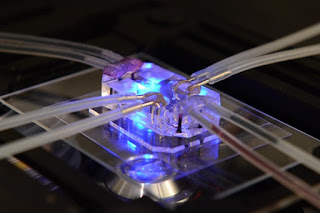Today almost everything is possible with the use of the technology everything around us can be easier. Technology such made a big difference in world as the time passes by especially in the medical world. One of the latest and hottest development in the world of medicines is the birth of organ on chips. An organ on chip is a microfluidic cell culture device created with microchip manufacturing methods that contains continuously perfused chambers inhabited by living cells arranged to simulate tissue- and organ-level physiology. By recapitulating the multicellular architectures, tissue-tissue interfaces, physicochemical microenvironments and vascular perfusion of the body, these devices produce levels of tissue and organ functionality not possible with conventional 2D or 3D culture systems. They also enable high-resolution, real-time imaging and in vitro analysis of biochemical, genetic and metabolic activities of living cells in a functional tissue and organ context. This technology has great potential to advance the study of tissue development, organ physiology and disease etiology. In the context of drug discovery and development, it should be especially valuable for the study of molecular mechanisms of action, prioritization of lead candidates, toxicity testing and biomarker identification.
Some of the business company that makes it accessible to found the right chips that you are using in the labs is Corsolutions they are based in New York that truly embodies the users needs. Body-on-a-Chip is an emerging research area that cultures human organ tissue in microdevices to accurately mimic their structure and function. The goal is to develop the best predictive model of human response to therapies, drugs, cosmetics and other chemical compounds. The applications for Body-on-a-Chip are far-reaching.
Some of the business company that makes it accessible to found the right chips that you are using in the labs is Corsolutions they are based in New York that truly embodies the users needs. Body-on-a-Chip is an emerging research area that cultures human organ tissue in microdevices to accurately mimic their structure and function. The goal is to develop the best predictive model of human response to therapies, drugs, cosmetics and other chemical compounds. The applications for Body-on-a-Chip are far-reaching.

